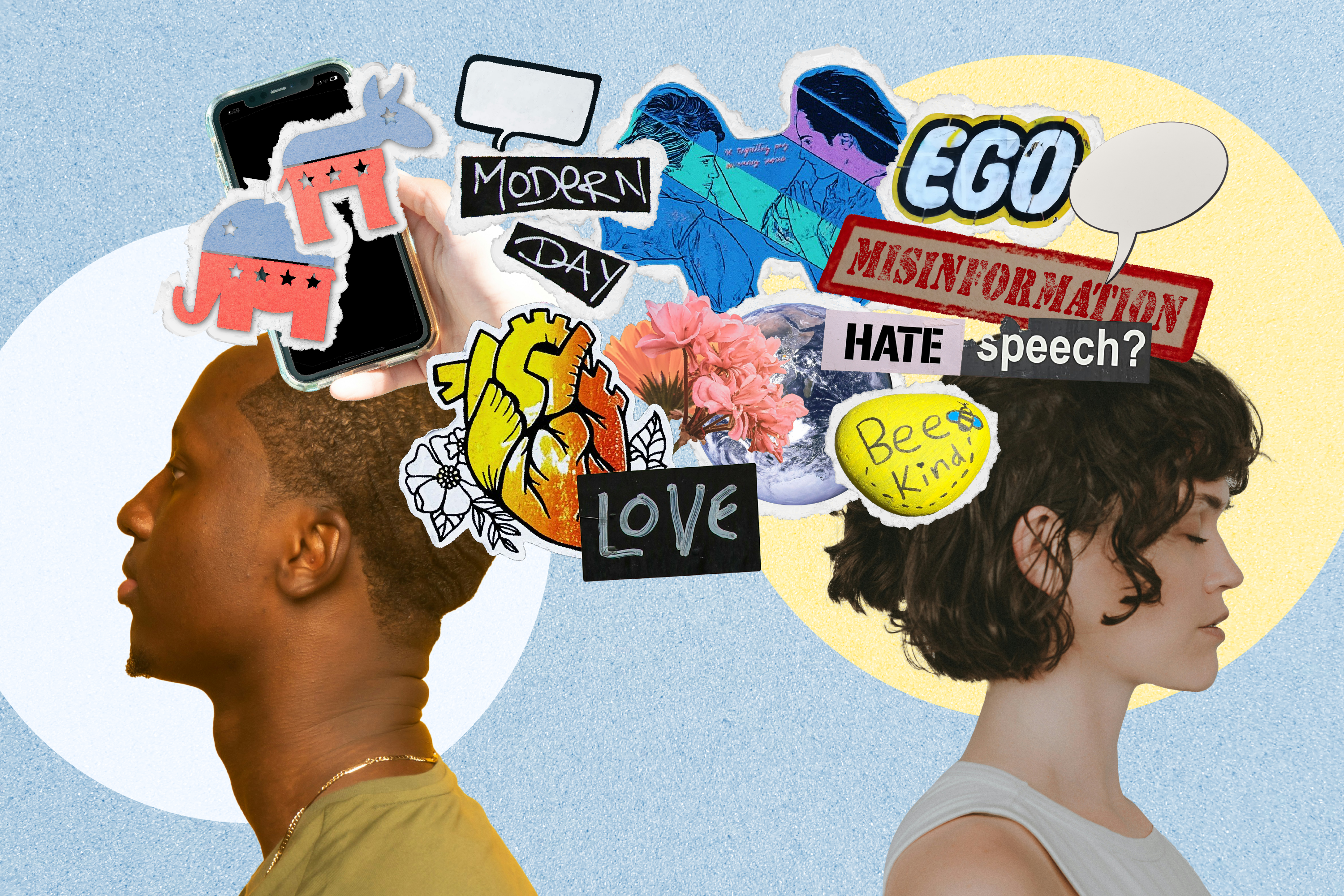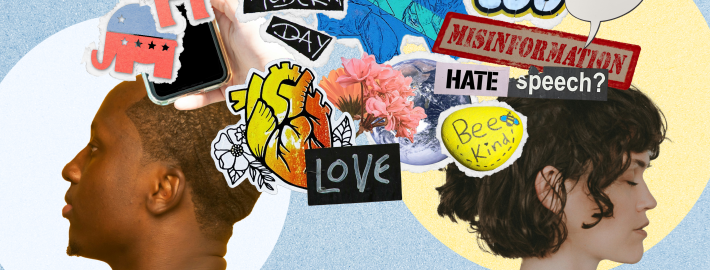The thing we all share: Dialogue across Difference

By Lucy Berbeo | Art by Katie Sipek | September 29, 2025
While the Bedari Kindness Institute and the Initiative to Study Hate seek to mitigate hate and advance kindness through interdisciplinary, cutting-edge research, Dialogue across Difference is geared toward building the muscle to accomplish these goals within the university setting — creating a laboratory, Myers says, for the kind of change he and Ferdman hope to see beyond campus as well. The multifaceted initiative encompasses a robust internship program, training opportunities like Resetting the Table’s Speaking Across Conflict workshop, Fiat Lux courses for students and a faculty fellows program spanning areas of expertise from health policy to law and from comparative literature to disability studies.
Conceived by Executive Vice Chancellor and Provost Darnell Hunt as part of a Four-Point Plan for a Safer, Stronger UCLA, the initiative was originally slated to launch in full on Oct. 15, 2023. But in the wake of the events on and after Oct. 7 that year, it was instead rolled out incrementally. Myers chaired the initiative and implementation committees and stayed on as faculty director, while Ferdman joined the team in September 2023.
Michele Moe-Forsyte, a faculty member with the Writing Programs in the UCLA Division of Humanities, remembers another divisive time on campus: She has taught at UCLA since the 9/11 attacks, now a quarter of a century ago. Her scholarly interest lies in what these politically divisive historical moments mean to students as they navigate a period of rapid intellectual development. Thinking back to the COVID-19 pandemic, the murder of George Floyd and the national racial reckoning that followed, Moe-Forsyte emphasizes the pressing need she and her colleagues saw for new tools to encourage dialogue in the classroom.
“It seems like many students coming out of the COVID era feel a deep distrust of political leaders, health care and electoral institutions, and we are seeing these fracture lines in our current students’ responses to more recent political conflicts, such as in the Middle East,” she says. “I don’t know that that’s the most academic of ways to explain why I think Dialogue across Difference is so necessary now, but I feel that we’ve been in a kind of whipsaw, back and forth, in terms of how we’re seeing the world, with so many students feeling out of control and afraid of talking to each other.”
Last fall, Moe-Forsyte and Rachel Ketai, also a member of the Writing Programs faculty, were named Dialogue across Difference faculty fellows, charged with incorporating the initiative’s values — intellectual engagement, curiosity, empathy, active listening and critical thinking — into course materials and teaching. The partnership, Ketai says, has been a natural one: Those same values are espoused by scholars of writing studies as part of the virtues of ethical rhetoric. That’s a concept that calls for appealing to our good character as speakers and writers and inviting the good character of those we’re speaking and writing to, even when we disagree with their point of view.
“One of the things we’re taught in Dialogue across Difference is to ask: ‘What’s the story behind that point of view?’ Because it’s hard to disagree with someone’s story,” Ketai says. “Good writing instruction is already about teaching students how to pay attention to opposing views, to listen to them thoughtfully, to represent them accurately, and to appeal to an audience they may not agree with — to build trust on the page in that way.”
As they find new ways to infuse these values into their work, Moe-Forsyte and Ketai will explore how these learning outcomes can reflect or incorporate these values in their work. It’s a big lift with a lot of potential, as Writing Programs educates thousands of undergraduates from all disciplines across campus each year. Both also participated this summer in Resetting the Table’s “Train the Trainer for Higher Education Administrators” workshop at UCLA, where they learned to lead Speaking Across Conflict workshops and explore how to integrate those dialogic tools into their curriculum.
Ultimately, Moe-Forsyte and Ketai say this work helps fill a need not only to keep building and rebuilding trust in the classroom, but also to create more unity among all members of the university community.
“The only upside that I see coming from the external attacks on the university in general — not just our campus but the idea of the university — is that it has given all students, staff, faculty and administrators a reason to see and remind themselves of what we have invested in this institution,” Moe-Forsyte says. “And I guess that just means everything to me. I’m hoping that by studying the thing we all share and by putting into practice some of the methods that Dialogue across Difference has been teaching us, people will be reminded they don’t have to agree about everything to have a kind of common, shared reality.”
To return to the full feature, click here.




